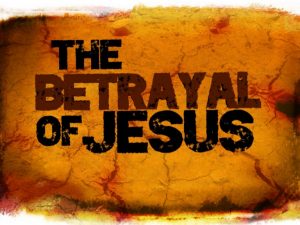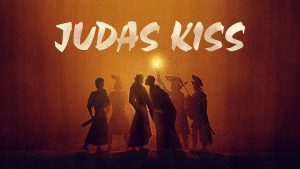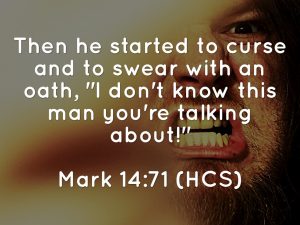Sorry, but the video recording of this message is not available.
 Last time with brother Alan we looked at our Lord’s struggle in Gethsemane. We said it was in Gethsemane that Jesus overcame the reluctance of His flesh to submit to the trial and task of the cross. Having spent time in prayer with the Father about what He was being asked to face, Jesus was prepared. After this time invested in prayerful preparation, Jesus was ready, as indicated by what He said to His disciples:
Last time with brother Alan we looked at our Lord’s struggle in Gethsemane. We said it was in Gethsemane that Jesus overcame the reluctance of His flesh to submit to the trial and task of the cross. Having spent time in prayer with the Father about what He was being asked to face, Jesus was prepared. After this time invested in prayerful preparation, Jesus was ready, as indicated by what He said to His disciples:
“The hour has come. Look, the Son of Man is delivered into the hands of sinners. Rise! Let us go! Here comes my betrayer!” – Mark 14:41b-42 (NIV)
Jesus was ready for the cross, which means He was ready to face His betrayer, Judas. Judas had agreed to betray the Lord for thirty pieces of silver (Matthew 26:14-15). Matthew tells us that Judas sought out the religious leaders and asked what they would pay him to betray Jesus; and now the time had come for Judas to make good on his promise.
(READ TEXT)Luke 22:47-53
This would have occurred sometime early on Friday morning, after midnight. There were sets groups of people at the scene.
- There were those who fought God – vs. 47-48
This who crowd that came to arrest Jesus was a crowd who were fighting against God. And they were led by Judas.
- What Judas did.
The night Jesus was arrested was in the middle of spring. The Passover moon would have been full; and John tells us it was a cold night (John 18:18). The old olive trees would’ve cast eerie shadows. So Judas betrayed Jesus with a kiss—a fail safe method of identifying Jesus to the soldiers who were with him in the shadowy darkness of the garden.
When a disciple would greet his rabbi, he would customarily greet him with a kiss on the cheek. So it was, that with a gesture that was designed to show respect, Judas betrayed the Lord.
 It is interesting to note that the word in Greek that is translated “kiss” here is not the usual word (phileo), but an intensive form of the word (kataphileo), which refers to a fervent, affectionate kiss. This fact shows us how low the human heart can go, and how well we can play the hypocrite. How could Judas betray Jesus like this?
It is interesting to note that the word in Greek that is translated “kiss” here is not the usual word (phileo), but an intensive form of the word (kataphileo), which refers to a fervent, affectionate kiss. This fact shows us how low the human heart can go, and how well we can play the hypocrite. How could Judas betray Jesus like this?
Well, it is interesting that those who were the most opposed to Jesus were well versed in practicing hypocrisy. Our Lord’s most fierce opponents were the religious leaders, of whom Jesus warned:
Matthew 23:3 do not do according to their deeds; for they say things and do not do them.
It’s ironic that those farthest from God are often those who pretend they’re the closest to Him. That was true of the religious leaders and of Judas. Judas aligned himself with the religious leaders rather than with his rabbi. He chose religion over relationship. Sadly, one of the worst enemies of being truly aligned with God is the practice of religion. A relationship with God through Christ leads to life; while an attempted relationship with God through religion leads to death. Judas was lost. Judas fought against God and rejected Jesus.
John 13:10b-11 and you are clean, but not all of you.” 11 For He knew the one who was betraying Him; for this reason He said, “Not all of you are clean.”
- Why Judas did it. Two trains of thought:
- 1) He rejected Jesus as the kind of Savior He came to be.Some theorize that Judas was trying to manipulate Jesus into being the earthly Messiah that Judas wanted Him to be. That this was all designed by Judas to manipulate Jesus into claiming Himself to be an earthly king and lead a Jewish revolt against their Roman oppressors.If this is correct, then it means that Judas was fighting against the expressed plan of God, for Jesus had clearly taught that His kingdom was not of this world. Judas refused to accept Jesus as the kind of Savior He came to be – the kind of Savior Judas needed.
- 2) He rejected Jesus simply because of His love of money.The Scripture clearly presents Judas as being a greedy man. John says that he regularly stole money from the money bag of Jesus and the disciples (John 12:5-6). So when his profit-motivated heart saw that Jesus’ kingdom plans would not result in his personal gain, he arranged to sell the Savior to the authorities for what money he could get. Whether Judas rejected Christ because he wanted Jesus to be an earthly king for him or a cash cow for him, the bottom line is that Judas refused to acknowledge Jesus as Lord. Consequently, he found himself fighting against God. Many today are doing the same. They reject Jesus as their Savior because they refuse to acknowledge Him as Lord; and consequently find themselves fighting against God.
“The question in salvation is not whether Jesus is Lord, but whether we are submissive to His lordship.” – John MacArthur
- Then there were those who forgot God – vs. 49-51
 The disciples who remained loyal to Jesus were thrown into a panic. Immediately some sprang into action, trying to keep Jesus from being arrested and taken away. However, they had forgotten that this was God’s plan all along. On more than one occasion, Jesus had explained God’s plan to them. What did He tell them? Luke 18:31-33 “Then He took the twelve aside and said to them, “Behold, we are going up to Jerusalem, and all things which are written through the prophets about the Son of Man will be accomplished. 32 For He will be handed over to the Gentiles, and will be mocked and mistreated and spit upon, 33 and after they have scourged Him, they will kill Him; and the third day He will rise again.” Jesus repeatedly told the disciples how the power of God would go to work to bring about our Lord’s resurrection and mankind’s redemption through His betrayal and suffering. Yet when the time came for all He had told them to be fulfilled, they completely panicked and forgot that God was in control of the situation from beginning to end.
The disciples who remained loyal to Jesus were thrown into a panic. Immediately some sprang into action, trying to keep Jesus from being arrested and taken away. However, they had forgotten that this was God’s plan all along. On more than one occasion, Jesus had explained God’s plan to them. What did He tell them? Luke 18:31-33 “Then He took the twelve aside and said to them, “Behold, we are going up to Jerusalem, and all things which are written through the prophets about the Son of Man will be accomplished. 32 For He will be handed over to the Gentiles, and will be mocked and mistreated and spit upon, 33 and after they have scourged Him, they will kill Him; and the third day He will rise again.” Jesus repeatedly told the disciples how the power of God would go to work to bring about our Lord’s resurrection and mankind’s redemption through His betrayal and suffering. Yet when the time came for all He had told them to be fulfilled, they completely panicked and forgot that God was in control of the situation from beginning to end.
- Initially, the disciples’ panic made them fight. Peter drew his sword and cut off the ear of the high priest’s servant (John 18:10).
- Eventually, the disciples’ panic made them flee. Mark says:Mark 14:50-52 And they all left Him and fled.51 A young man was following Him, wearing nothing but a linen sheet over his naked body; and they *seized him. 52 But he pulled free of the linen sheet and escaped naked. Most scholars believe the young man mentioned here was none other Mark, the author of the Gospel that bears his name.
- But Christ called them to faith. Jesus said, “No more of this!” and healed the man’s ear. Matthew adds that Jesus told them He could call on the Father, who could send twelve legions of angels to rescue Him. But instead, His being arrested and going to the cross was all part of the Father’s plan (Matthew 26:53-54).
 John 18:4-6 So Jesus, knowing all the things that were coming upon Him, went forth and *said to them, “Whom do you seek?” 5 They answered Him, “Jesus the Nazarene.” He *said to them, “I am He.” And Judas also, who was betraying Him, was standing with them. 6 So when He said to them, “I am He,” they drew back and fell to the ground. What’s interesting is that the word “he” is provided by the translators. The original Greek text simply says, “I am.” In other words, Jesus answered affirming His deity and the corresponding response of the crowd was a demonstration of His deity. Jesus was letting everyone know that He was in charge. And He’s still in charge today. So when you or I find ourselves tempted to panic in response to circumstances we don’t understand, let’s not give into the fight or flight response, but instead, let’s place our faith in the One who is I Am – the one who is all we need regardless of the situation.
John 18:4-6 So Jesus, knowing all the things that were coming upon Him, went forth and *said to them, “Whom do you seek?” 5 They answered Him, “Jesus the Nazarene.” He *said to them, “I am He.” And Judas also, who was betraying Him, was standing with them. 6 So when He said to them, “I am He,” they drew back and fell to the ground. What’s interesting is that the word “he” is provided by the translators. The original Greek text simply says, “I am.” In other words, Jesus answered affirming His deity and the corresponding response of the crowd was a demonstration of His deity. Jesus was letting everyone know that He was in charge. And He’s still in charge today. So when you or I find ourselves tempted to panic in response to circumstances we don’t understand, let’s not give into the fight or flight response, but instead, let’s place our faith in the One who is I Am – the one who is all we need regardless of the situation.
“With the goodness of God to desire our highest welfare, the wisdom of God to plan it, and the power of God to achieve it, what do we lack?” – A.W. Tozer
- There was One who followed God – vs. 52-53
As He was arrested and taken away, we notice that Jesus was all alone. Everyone had fled and He was left alone with the angry mob. Jesus was absolutely alone as He submitted to the Father’s will and went to the cross. They bound the hands of Jesus, In the garden where He prayed; They led Him through the streets in shame. They spat upon the Savior, So pure and free from sin; They said crucify Him He’s to blame. Upon His precious head, They placed a crown of thorns; They laughed and said behold the King. They struck Him and they cursed Him, And mocked His holy name; All alone He suffered everything. To the howling mob He yielded, He did not cry for mercy; The cross of shame He took alone. And when He cried it’s finished, He gave Himself to die; Salvation’s wondrous plan was done. He could have called ten thousand angels To destroy the world and set Him free He could have called ten thousand angels But He died alone for you and me Which of these three groups best describes you today?
Are you among those who are fighting with God, resisting His call to trust Him alone as the Savior your need? Fight Him no longer, but surrender to Him today. Are you among those who are forgetting to trust God with their circumstances? Don’t depend on yourself, but trust in Him completely today. He is your “I Am”. He is all you need and you can trust Him. Are you among those who are seeking to be like Jesus? Following God? Jesus followed the will of God for our sakes; now, let us commit ourselves to following the will of God for His sake.
Peter’s Triple Denial:  We have here the sad story of Peter’s denying his Master, at the time when He was arraigned before the high priest. Peter’s betrayal is reported in all four Gospels, which indicates something of the importance the Gospel writers saw in this defection of the disciples’ leader. Luke 22:54 Having arrested Him, they led Him away and brought Him to the house of the high priest; but Peter was following at a distance. Matthew 26:58 But Peter was following Him at a distance as far as the courtyard of the high priest, and entered in, and sat down with the officers to see the outcome. Mark 14:54 Peter had followed Him at a distance, right into the courtyard of the high priest; and he was sitting with the officers and warming himself at the fire. John 18: 15-16 Simon Peter was following Jesus, and so was another disciple. Now that disciple was known to the high priest, and entered with Jesus into the court of the high priest, 16 but Peter was standing at the door outside. So the other disciple, who was known to the high priest, went out and spoke to the doorkeeper, and brought Peter in. Jesus’ captors tied Him up and led Him from the Garden of Gethsemane to the palace of the high priest, Caiaphas. Some Bible scholars believe that Christ was led by a chain that was placed around His neck. When the Lord was brought into the high priest’s house, Peter followed at a distance. He is about to discover how easy it is to make a promise (Mark 14:29–31), and how hard it is to fulfill. However, by just following Christ and His captors he showed that he was concerned for his Master. We can commend him for that, but why did he do it? Could it be that he wanted to be safe, to satisfy his conscience, out of curiosity, or to save his reputation? We are not told, but each of us may venture a guess. The Apostle John reports that another disciple was with Peter, and both followed the crowd right into the courtyard of Caiaphas. The other disciple is unknown, but may well have been John, the son of Zebedee. This disciple knew the high priest and therefore had access to the high priest’s courtyard. Therefore, he was in a unique position to know what was going on and to get Peter into the courtyard.
We have here the sad story of Peter’s denying his Master, at the time when He was arraigned before the high priest. Peter’s betrayal is reported in all four Gospels, which indicates something of the importance the Gospel writers saw in this defection of the disciples’ leader. Luke 22:54 Having arrested Him, they led Him away and brought Him to the house of the high priest; but Peter was following at a distance. Matthew 26:58 But Peter was following Him at a distance as far as the courtyard of the high priest, and entered in, and sat down with the officers to see the outcome. Mark 14:54 Peter had followed Him at a distance, right into the courtyard of the high priest; and he was sitting with the officers and warming himself at the fire. John 18: 15-16 Simon Peter was following Jesus, and so was another disciple. Now that disciple was known to the high priest, and entered with Jesus into the court of the high priest, 16 but Peter was standing at the door outside. So the other disciple, who was known to the high priest, went out and spoke to the doorkeeper, and brought Peter in. Jesus’ captors tied Him up and led Him from the Garden of Gethsemane to the palace of the high priest, Caiaphas. Some Bible scholars believe that Christ was led by a chain that was placed around His neck. When the Lord was brought into the high priest’s house, Peter followed at a distance. He is about to discover how easy it is to make a promise (Mark 14:29–31), and how hard it is to fulfill. However, by just following Christ and His captors he showed that he was concerned for his Master. We can commend him for that, but why did he do it? Could it be that he wanted to be safe, to satisfy his conscience, out of curiosity, or to save his reputation? We are not told, but each of us may venture a guess. The Apostle John reports that another disciple was with Peter, and both followed the crowd right into the courtyard of Caiaphas. The other disciple is unknown, but may well have been John, the son of Zebedee. This disciple knew the high priest and therefore had access to the high priest’s courtyard. Therefore, he was in a unique position to know what was going on and to get Peter into the courtyard.
Luke 22:55 After they had kindled a fire in the middle of the courtyard and had sat down together, Peter was sitting among them.Peter continued to keep his distance by associating himself with the high priest’s servants when he should have been at his master’s elbow. The servants kindled a fire in the midst of the hall and sat down together, to talk over their night-expedition to capture Jesus. Probably Malchus, the man whose ear Peter cut off and Jesus healed, was among them; and Peter sat down among them, as if he was one of them, at least he wanted them to think he was. His fall into disgrace was disclaiming all acquaintance with Christ, and relation to him, disowning him because he was now in distress and danger.
- Luke 22:56 And a servant-girl, seeing him as he sat in the firelight and looking intently at him, said, “This man was with Him too.”
- Matthew 26:69 Now Peter was sitting outside in the courtyard, and a servant-girl came to him and said, “You too were with Jesus the Galilean.”
- Mark 14:66-67 As Peter was below in the courtyard, one of the servant-girls of the high priest *came, and seeing Peter warming himself, she looked at him and *said, “You also were with Jesus the Nazarene.”
- John 18:17 Then the slave-girl who kept the door *said to Peter, “You are not also one of this man’s disciples, are you?” He *said, “I am not.”
Inside, he took his place with those who were warming themselves at a fire in the center of the courtyard. It was a cold spring evening. Jerusalem being about 2,500 feet above sea level would definitely have cold evenings. This little detail about the cold evening is another indication that the author of John’s Gospel was an eyewitness. A servant girl, who was the doorkeeper in Annas’ house, looked across at Peter and exclaimed that he was one of the followers of Jesus. Perhaps, while at the Temple she had seen Jesus there and Peter with Him, and now she remembered him and said This man was also with him.
- Luke 22:57 But he denied it, saying, “Woman, I do not know Him.”
- Matthew 26:70 But But he denied it before them all, saying, “I do not know what you are talking about.”
- John 18:18 Now the slaves and the officers were standing there, having made a charcoal fire, for it was cold and they were warming themselves; and Peter was also with them, standing and warming himself.
- John 13:13-18 says that this first denial took place while Jesus was being examined by Annas, father-in-law of Caiaphas. It could be that the houses of Annas and Caiaphas shared a common courtyard. Both could have lived at the palace since Caiaphas was the high priest and Annas his father-in-law was High priest emeritus.
Peter did not have enough courage to admit he was a disciple of the Lord Jesus, and likewise, he did not have the presence of mind to know how to stop this woman’s allegations, and therefore he emphatically and plainly denies it: Woman, I know him not. Peter’s denial was wicked and sinful; he even cursed and swore in his denial (Mark 14:71). However, he was no more sinful than any of us. His denial of Christ to the servant girl was a striking contrast to his earlier boast to lay down his life for Jesus (John 13:37), and his show of offense in cutting off Malchus’ ear. Evidently, the other disciple was also in danger (perhaps greater), but he did not deny Jesus.
- Luke 22:58 A little later, another saw him and said, “You are one of them too!” But Peter said, “Man, I am not!”
- Matthew 26:71-72 When he had gone out to the gateway, another servant-girl saw him and *said to those who were there, “This man was with Jesus of Nazareth.” 72 And again he denied it with an oath, “I do not know the man.”
- Mark 14:68 But he denied it, saying, “I neither know nor understand what you are talking about.” And he went out onto the porch.
- John 18:25 Now Simon Peter was standing and warming himself. So they said to him, “You are not also one of His disciples, are you?” He denied it, and said, “I am not.”
Shortly afterward, someone else pointed the accusing finger at Peter as one of the followers of Jesus of Nazareth. For the second time, Peter denied the accusation.
- Luke 22:59 After about an hour had passed, another man began to insist, saying, “Certainly this man also was with Him, for he is a Galilean too.”
- Matthew 26:73 A little later the bystanders came up and said to Peter, “Surely you too are one of them; for even the way you talk gives you away.”
- Mark 14:69 The servant-girl saw him, and began once more to say to the bystanders, “This is one of them!”
- John 18: One of the slaves of the high priest, being a relative of the one whose ear Peter cut off, *said, “Did I not see you in the garden with Him?”
And for the third time, and after about an hour had passed another confidently asserts, “Of a truth this fellow also was with him, let him deny it if he can, for you can all see he is a Galilean.’’ Peter had lied twice already, so he must continue the lie. John adds that the final question was asked by a relative of Malchus, whom Peter had tried to kill in the garden.
- Luke 22: But Peter said, “Man, I do not know what you are talking about.” Immediately, while he was still speaking, a rooster crowed.
- Matthew 26:74 Then he began to curse and swear, “I do not know the man!” And immediately a rooster crowed.
- Mark 14:70-72 But again he denied it. And after a little while the bystanders were again saying to Peter, “Surely you are one of them, for you are a Galilean too.” But he began to curse and swear, “I do not know this man you are talking about!”
- John 18:27 Peter then denied it again, and immediately a rooster crowed.
This time Peter not only denies that he is a disciple of Christ, but that he knows anything about him: “Man, I don’t know what you are saying; I never heard of this Jesus.’’ A comparison of the Gospel accounts shows that some people are talking to Peter and some are talking about him. Accusations are flying in from every direction. This is enough to get anyone excited, especially excitable SimonPeter! He answers, “Man, I don’t know what you are saying” Peter not only denied that he knew Jesus but as Matthew wrote He began to curse and swear. He must have said something like, “May God do this or that to me if it is true that I am or ever was a disciple of Jesus.” He stands there invoking on Himself One curse upon another. And the louder this Galilean talks, the more, without realizing it, He is saying to all those standing around, “I am a Liar.”
What happened next was probably this: Jesus, His night trial ended, was being led across the court to His prison cell, from which in a few hours He would be led once more before the Sanhedrin.
 The cock crowed just as he was denying that he knew Christ, for the third time. There is some difference of opinion over what is meant by the cock crowed. First, it may be as simple as a rooster crowed. I think this is what happened, God who can control any creature made the rooster crow at this exact time. Second, some believe it could refer to the night watches, which were set up for security reasons. The change in personnel on a watch was announced by a loud sound. There were two “cock crowings,” one after midnight, the other before dawn. This was the Roman method of dividing the night, but it was also how the Jews did it.
The cock crowed just as he was denying that he knew Christ, for the third time. There is some difference of opinion over what is meant by the cock crowed. First, it may be as simple as a rooster crowed. I think this is what happened, God who can control any creature made the rooster crow at this exact time. Second, some believe it could refer to the night watches, which were set up for security reasons. The change in personnel on a watch was announced by a loud sound. There were two “cock crowings,” one after midnight, the other before dawn. This was the Roman method of dividing the night, but it was also how the Jews did it.
- Luke 22:61 The Lord turned and looked at Peter. And Peter remembered the word of the Lord, how He had told him, “Before a rooster crows today, you will deny Me three times.”
- Matthew 26:75 And Peter remembered the word which Jesus had said, “Before a rooster crows, you will deny Me three times.” And he went out and wept bitterly.
And the Lord turned, and looked upon Peter with eyes full of pain. This was one of Peter’s lowest points. He had publicly denied Christ three times. Later, Christ made Peter publicly confess three times that he loved his Lord (John 21:15–19).
This short event is not mentioned by the other evangelists, but it is a very remarkable one. Christ is here called the Lord, for there is a great deal of power and grace involved with the actions of our Lord. Although Christ now had his back turned to Peter, and was occupied with his trial (when one would think, he had nothing else on His mind), yet he knew all that Peter said. Note, Christ takes more notice of what we say and do than we think he does.
When Peter disowned Christ, Christ did not disown him, although He would have been justified if He threw him away, and never looked at him again, and deny him before his Father. We should be glad that Christ does not deal with us as we deal with him.
 Christ looked upon Peter, but this does not mean that He doubted Peter would soon be aware of it. He knew that, although he had denied him with his lips, yet his eye would still be towards him. Although Peter was guilty of a very great offense, Christ would not call out to him, because He did not want to shame him or expose him. He only looked at Him in a way that only Peter would understand the meaning of that look. Power went along with this look, to change the heart of Peter. Now, “Peter remembered the words of the Lord;’’ remembered the prediction that before the rooster crows, he would deny Him three times.
Christ looked upon Peter, but this does not mean that He doubted Peter would soon be aware of it. He knew that, although he had denied him with his lips, yet his eye would still be towards him. Although Peter was guilty of a very great offense, Christ would not call out to him, because He did not want to shame him or expose him. He only looked at Him in a way that only Peter would understand the meaning of that look. Power went along with this look, to change the heart of Peter. Now, “Peter remembered the words of the Lord;’’ remembered the prediction that before the rooster crows, he would deny Him three times.
There was someone else there that day to observe the proceedings; Satan was in the court. Satan was in the courtyard to sift Peter and in the council chamber to lead the men astray. But his victory over Peter was only temporary, since the apostle wept, repented, and was restored. His victory over the religious leaders was complete since he blinded their eyes to the truth and they condemned their own Messiah.
Luke 22:62 And he went out and wept bitterly. One look from Christ melted him into tears of godly sorrow over His cowardly sin.
The early church understood that once the Holy Spirit came into your life, it would never again be the same! Much of that understanding was related to the fact that the Greek and Hebrew words for spirit are also the same words used for breath. The first Christians knew that the presence of the spirit in their lives was their literal breath of life. On the day of Pentecost, not only was the “breath” provided that made spiritual language possible, but the “spirit” that energized a whole lifestyle change was present as well. As an example, compare this passage, death with Peter on the night of Jesus’ Peter on the day of Pentecost (see Acts 2:14–41). It is the presence of the Holy Spirit which also produces the fruits of a lifestyle filled with God’s love and power. Galatians 5:22, 23 clearly declares that Holy Spirit’s fullness is more than mere language. It is also the fullness of the One who is changing us into the likeness of our Savior.
- Luke 22:66 When it was day, the Council of elders of the people assembled, both chief priests and scribes, and they led Him away to their council chamber, saying,
- Matthew 27:1 Now when morning came, all the chief priests and the elders of the people conferred together against Jesus to put Him to death;
- Mark 15:1 Early in the morning the chief priests with the elders and scribes and the whole Council, immediately held a consultation; and binding Jesus, they led Him away and delivered Him to Pilate.
We left Christ in the hands of the chief priests and elders, condemned to die, but they could only show their teeth; about two years before this the Romans had taken from the Jews the power of capital punishment; they could put no man to death, and therefore early in the morning another council is held, to consider what is to be done. And here we are told what was done in that morning-council after they had slept for two or three hours.
At daybreak (5:00–6:00 a.m.), the elders … led Jesus away to their council, or Sanhedrin. The members of the Sanhedrin asked Him outright if He was the Messiah. Jesus said, in effect, that it was useless to discuss the matter with them. They were not open to receive the truth. But He warned them that the One who stood before them in humiliation would one day sit on the right hand of the power of God (see Psalm 110:1).
This hearing is the third stage of the religious trial. They discussed in detail the charges and how they would present them in order to gain the death sentence. It took place before the Sanhedrin in the morning to make the trial official.
The trial held at night could not sustain a verdict since it was illegal for several reasons. First, no case was to be completed on the same day it was begun unless the defendant was acquitted. Secondly, a night was supposed to elapse before the verdict was pronounced “so that feelings of mercy might have time to arise.” In this case, the religious leaders seemed intent on stifling any feelings of mercy, and their one purpose was “to put him to death.” However, since night trials were unconventional, they convened a morning session to give legal validity to their verdict. Third, when an official body like the Jewish Sanhedrin, by the unofficial and illegal action of its members, goes in search of witnesses against Jesus, when it brings Jesus before Annas, a man who no longer had any judicial authority (though he probably still exercised a tremendous amount of influence), when the high priest attempts to force the prisoner to testify against Himself, the only fair conclusion is that we are dealing here with a case not of justice but of the perversion of justice.
Under Roman rule, the Jewish leaders had no authority to inflict capital punishment. It was for that reason that the apostle Mark adds, “They bound Jesus, and carried him away, and delivered him to Pilate, the Roman governor.” Though their hatred of everything Roman was intense, they were willing to “use” this power to satisfy a greater hatred. Opposition to Jesus unites the bitterest enemies.
Luke 22:67a “If You are the Christ, tell us.”
So now, this imposing body, with Caiaphas in charge, is asking Jesus to make a statement that can be used by them to formulate a charge sufficient to have Him put to death! If He will now only cooperate and tell them that He is the Christ—with all the political overtones they could read into this confession (that He is the Messiah, the Jewish King)—He could be accused before the Roman authorities of being a danger to the state and destroyed. It is for this reason that they asked Him the question whether He is the Christ, and not because they would really want to know whether He is or not.
The Sanhedrin subjected Christ to the same set of questions He had been asked in the nighttime trial, and the answers He gave were essentially the same (see Matthew 26:63-66 and Mark 14:61-64).
Luke 22:67b-69 But He said to them, “If I tell you, you will not believe; and if I ask a question, you will not answer. 69 But from now on the Son of Man will be seated at the right hand of the power of God.”
What Jesus is saying amounts to this, “No matter what I say, you will certainly not believe me, for you are prejudiced. And if I put a question to you regarding this matter in order that by this method you might be led to the right answer, you will certainly not answer.” He declined to answer directly because He knew that answering was useless. He knew they would not believe Him because earlier He had asked some of them about John’s authority and they had refused to answer (see Luke 20:1-8). At that time they had revealed their blindness to spiritual insight. Thus, if He asked them anything at this time to help clarify the matter before them, they would not answer.
The Lord referred them to his second coming, for proof of his being the Christ, but they refused to accept His claim of deity as being true: “Hereafter shall the Son of man sit, and be seen to sit, on the right hand of the power of God, and then you will not need to ask whether he be the Christ or not.’’ The idea that the Messiah would be seated at the right hand of God was accepted even in Jewish circles. As to the expression “the power of God,” here the reference is to God in all His majesty and greatness. Jesus could see beyond the sufferings of the cross to the glories of the throne (Philippians 2:1-11)
Luke 22:70 And they all said, “Are You the Son of God, then?” And He said to them, “Yes, I am.”
Jesus called Himself the Son of Man, referring to Daniel’s vision of the Son of man that came near before the Ancient of days, (Daniel 7:13-14). But they understood that as the Son of Man He was also the Son of God. Therefore, they would use His own words as proof that He was a madman and an enemy of Rome. They asked Him plainly if He was the Son of God. There is no question what they meant; they inferred that He set up himself as the Son of God. To them, the Son of God was One who was equal with God. The Lord Jesus answered “You rightly say that I am” ([Mark 14:62). That was all they needed, for now they heard Him speak blasphemy, claiming equality with God? There was no need for further testimony. But there was a problem. In their law, the penalty for blasphemy was death. Yet the Jews were under Roman power and they did not have the authority to put prisoners to death. So they had to take Jesus to Pilate, and he would not be the least bit interested in a religious charge such as blasphemy. So they had to make political charges against Him.
Luke 22:71 Then they said, “What further need do we have of testimony? For we have heard it ourselves from His own mouth.”
This would be the ground for His conviction; that He said He was the Son of God and that He was equal with God; claims that no mere man could make. What they failed to understand was that He was no mere human. He was both the Messiah and the Son of God. So the high priest yelled out, What need we any further witness? And then he tore his garments (Matthew 26:65; Mark 14:63). It was true, they did not need any more witnesses to prove that He said he was the Son of God, they had it from his own mouth, but they did need proof that he was not the Son of God before they could condemn him as a blasphemer. This accusation will not carry any weight with Pilate, because he is a pagan. But with the masses of the people whom they must now at all costs incite against the Savior, this will be a tremendous force. They could not accept that it was possible He might be who He said He was. If it was true, they would bring upon themselves a horrible feeling of guilt for putting Him to death? They cannot believe that He was the Messiah, even though He was endowed with divine power and grace, and had performed many miracles. They could not believe in Him, because of His appearance. He did not appear as they expected, in worldly pomp and grandeur. Their eyes being blinded with the desire for a military Messiah, who would defeat the Romans and then rule over Israel with pomp and ceremony, but that was not what Jesus came to give them, so they rush on into the procedure for prosecuting the Lord Jesus Christ. In rejecting Jesus, they were acting on behalf of the nation.
The “religious trial” was now over. The next step was to put Him through a civil trial and convince the Roman governor that Jesus of Nazareth was a criminal worthy of death. The Son of God was to be crucified and only the Romans could do that.


0 Comments